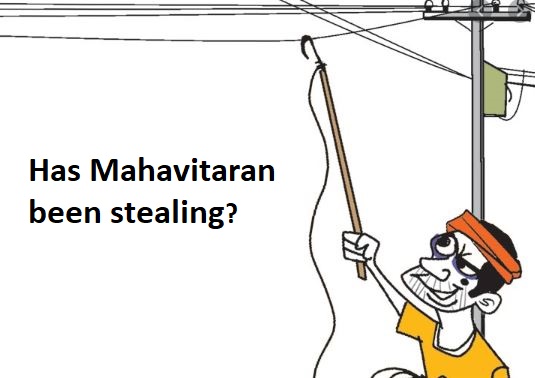

Have Subsidies Built Perverse Incentives >
In a week where the Aam Aadmi Party is expected to comfortably romp home to a victory in the state elections at New Delhi, comes the news of a potentially massive power fraud in Maharashtra. The AAP victory has been attributed to, among other things, its free power scheme , where it has made power free for consumption upto 200 units, and at a 50% price for consumption till 400. The slack is carried completely by consumers consuming over that limit, with escalating prices at each 200 unit slab. The same story has been repeated with the party’s free water scheme for supply upto 20,000 litres. We mention AAP because even as it promotes this ‘governance’ model in India’s richest state for the rest of India, Maharashtra’s latest ‘scam’ potentially shows up its limitations and risks .
The MERC (Maharashra Electricity Regulatory Commission) appointed committee has filed a report that accuses the state power distribution utility, Mahavitaran or MSEDCL as its English moniker goes, of outright fraud. The report claims that MSEDCL has overcharged domestic consumers by Rs 22,000 crores over a 5 year period between 2014 and 2019, by inflating agricultural consumption.
This committee by the MERC itself had been formed after the findings of another committee , headed by MSEB (Maharashtra State Electricity Board) Director Vishwas Pathak, that had also accused the utility of inflating claims in 2017. The Pathak committee had blamed MSEDCL for inflating water pump usage figures by upto 90 percent to show higher agricultural share of power consumption.
The current panel includes MERC executive director Rajendra Ambedkar, and GD Patil. It was assisted by power sector focused organisations including Prayas, Idam Infrastructure Advisory and the Administrative staff College of India. With such a distinguished line up, it will be very hard to brush the report of the committee under the carpet, as was done to the Pathak report earlier.
The number puts in doubt Mahavitaran’s claim of distribution losses of 15,400 million units per year, or 14 percent of total distribution. After adding the extra 11000 million extra units, which it has allegedly been attributing to agricultural production, that loss moves to 24 percent. A figure that will place it squarely among the worst performing discoms in India.
The high agricultural number was being used by the firm to justify its high costs for non agricultural consumers, who end u paying between 50 percent to 100 percent over the purchase cost of power for the discom. Agricultural customers pay for power at Rs 1.50 per unit, versus the buying cost of Rs 4. So how can a discom do this?
The first para in the report explains. ” Electricity consumption by agriculture consumers constitutes almost 1/5th of total electricity
consumption in India. In most of the agriculture dominant states, the sale of electricity for agriculture is reported to be in the range upwards of 30%. Out of such reported sales, significant portion is ‘Estimated Sales’ owing to a large number of agriculture consumers being unmetered or with no energy meters installed. Based on review of statistics carried out, it is observed that more than 35% AG consumers in states like, Maharashtra, Gujarat, M.P are unmetered with exceptions of Punjab where 90% of AG consumers are unmetered and in Rajasthan only 10% of AG consumers are unmetered. Supply of electricity without meters remains a fact even after around 17 years of implementation of the Electricity Act, 2003 which has mandated supply of electricity only through meters, in pursuance of its Section 55″.
What the whole ‘scam’ shows that subsidies, if given for long enough, will inevitably create vested interests, and corrupt practices that will stifle change later. In state after state, agricultural subsidies have been blamed for most of the losses discoms reel under. This is why even relatively expensive options like dedicated green corridors, created exclusively to meet agricultural demand, have found support, if only to better track actual agricultural consumption. In fact, another para from the report will explain the extent of the challenge here. ” The analysis of AG metering status based on field survey of nearly 1,14,000 consumers spread across the state shows that compared to utility records, meters are present for only 30% metered AG consumers. Further in cases where meter readings could be validated, more than
50% readings were found to be incorrect. This highlights significant challenges in metering agricultural consumers”. This, on a survey base of 114,000 consumers.
Smart meters, that better help track actual usage are one answer. However, a better solution is clearly to identify individual beneficiaries and transfer subsidy amounts directly to their accounts. As has been done for the PM-KISAN scheme.
So how do such schemes impact renewable energy? For one, farmers have clearly been reluctant to embrace solar energy, without huge incentives again. After all, how can anything compete with free, or Rs 1.50 per unit?
A second blow has been stuck for solar power across categories like rooftop and commercial. With these customers paying a huge price premium for their grid power, the discom has been loathe to let them generate cheaper solar power, or even reduce their bills by producing some of their own power. Hence, the foolish attempts to muzzle it by pushing for net billing for instance, or even gross billing.
Houston headquartered Syzygy Plasmonics has announced the beginning of Front-End Engineering and Design (FEED) with…
State owned THDC India Limited (THDCIL) has announced the successful commencement of COD process of…
The Uttar Pradesh government is preparing to launch the Uttar Pradesh Sustainable Aviation Fuel (SAF)…
India’s cooperative sugar industry is urging the government to revise ethanol procurement prices and extend…
The Indian Biogas Association (IBA) has announced a key step taken to boost biofuels sector…
In a key development that would bolster the development of green hydrogen in the North…